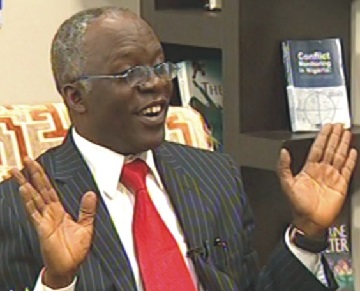Expecting Buhari to maintain law, order in your states is wrong, Falana tells Nigerian governors

Human rights lawyer, Femi Falana on Wednesday told governors of the 36 states of the federation not to expect President Muhammadu Buhari to help them maintain law and order in their states, saying the governors have the power to control the police in their states.
Falana spoke at a Colloquium in honour of the Executive Editor, The News/PM News, Kunle Ajibade who turned 60 two days ago. The event was held at the Nigeria Institute of International Affairs, NIIA, Victoria Island, Lagos, Southwest Nigeria. The theme of the event is: “A Brighter Future for Nigeria and how to get there.”

Noting that there had been so much killings in the land, Falana said equivocally that it was not the duty of the federal government to maintain law and order in the states, as such duties belonged to the governors.
“A governor cannot go to the television and be crying that your people are killed, no; under the constitution of 1999, section 214, we didn’t have a federal government police, we have the Nigerian Police Force which shall be controlled, organised and supervised by the Nigerian Police Council.
“Who are the members of the Nigerian Police Council? The president as Chairman, Inspector General of Police, the Chairman of the service commission and the 36 state governors; so, we have a body where the governors constitute the largest number to determine the fate of the police. The president cannot appoint the IGP without seeking your consent or remove one but what has happened since 1999, the governors have totally abdicated the responsibility of managing the Nigerian police force to the president. No governor is informed, they are only informed in a meeting and nobody will oppose to it and that is the end of the matter. That is why we are in this mess.
“We are in a republic where the supreme court has held that the governor of a state is not for decoration, you have the power to give instruction to the police, the only time he can disapprove your instructions is when he says please, I want to confirm from the president,” said.
Falana stated that under this dispensation, he had never heard of a situation where a governor ordered a Commissioner of Police to look for kidnappers who were causing problem in his state and the commissioner said no, adding that “the only thing by Abuja is the payment of their salary, the operational allowances, equipment and the rest have been abandoned to the state; why then are they not taking control of the law and order in their states?”
Lamenting that people were still currently being killed in Kaduna, Zamfara, Benue and Taraba, the human rights activist added that armed robbery and kidnapping were also going on in other parts of the country.
“How did we get here? So, if we are gathered here to discuss the future of Nigeria, there has to be peace before we can plan ahead. Armed bandits have killed about 5,000 people in the last one-year in Zamfara State. Since the government has lost the monopoly of violence to criminals that is happening now, it is high time we call on the National Assembly to enact a law to allow military training for Nigerian citizens and pending the enactment of that law, I am calling on the president to make facilities available in those states where lives have become totally endangered so that young men and women can still make it even. I am not saying anything radical, this is inline with section 220 of the Nigerian constitution,” he said.
In his address, Osun State Governor, Rauf Aregbeola aligned with Falana’s position, while urging Nigerians not to be despaired.
“The success of any African country as said by former Ghanaian president will be nothing if it is not linked to the success of the people. My vision is for a Nigeria that will give leadership to other nations, particularly within the Lake region of Africa, where the wealth of our race is. Actually, Nigeria has the potential to rally the annexation of the resources in Central Africa namely Congo, Kenya and others. Only Nigeria has the means to lead the process of using the resources for the uplift of black race,” he said.









